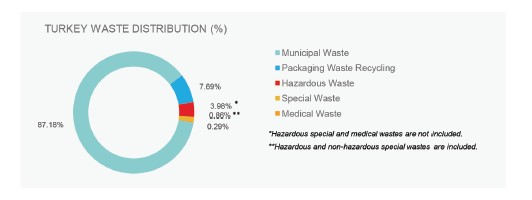Are we aware of how we are over-using the natural resources of the planet and about the “Earth Overshoot Day” which is August 1 for 2018 and coming earlier each year? What about the tremendous economic loss of huge quantities of solid wastes disposed of by dumping?
“Waste” issue, over the years, has been mostly considered as an important environmental problem in Turkey that has been discussed from different points of views including different solution alternatives for their disposal.
However; with the adoption of “Circular Economy” and “Zero Waste” concepts in all over the world, the impacts of the United Nations Sustainable Development Goals (SDGs) and the transition to “Low Carbon Economy” in Turkey especially by 2015; wastes have been started to considered as a “solution” rather than a “problem”; as a “valuable resource” to be re-used as a raw material, rather than a “garbage”.
Along with the increased attention on the environmental issues, the subjects of “integrated/sustainable waste management hierarchy”, “climate change”, “renewable energy”, “waste to energy” etc. have become major topics all over the world.
The “Linear Economy Model”, which is more commonly referred to a “take, make, waste” approach used until recent years in all over the world, proved that the existing natural resources would not be enough to ensure a healthy and prosperous life for the world population.
The projections have been pointed out that the transition towards the “Circular Economy Model”, which envisages a change in the production/consumption behaviors based on a zero waste and reuse/recycling approaches, will help not only to the environmental protection and the prevention of rapid natural resource depletion, but also can expose over 4-5 trillion Dollars additional economic growth potential by 2030.
The concepts of “Industrial Symbiosis” and “Waste Exchange System”, where a waste of one industry becomes a resource/secondary raw material for another industry, have gained increasing attention as a sustainable and economically beneficial option from the points of growth potential and new employment opportunities and started to be applied in Turkey recently within the context of “Circular Economy Model”.
The loss of waste due to dumping in landfill sites through the linear economy model can be re-gained by the circular economy concept through re-introducing these wastes into market as a raw material or an energy resource.
According to the Solid Waste Control Regulation of Turkey (05.04.2005 date and the Official Gazette No. 25777); “solid waste” covers the solid matter to be thrown by the manufacturer that has to be disposed in a sanitary way for the public peace and health, especially in terms of environmental protection, and the treatment sludges.
Turkish Statistical Institute (TURKSTAT) revealed that Turkey’s total population was 79 million 814 thousand at the end of 2016 and it is estimated to reach over 80 million in 2019.
The rapid growth of the population and a consequent rapid consumption cause to generation of huge amount solid wastes. TURKSTAT presented that the waste generation of Turkey was around 31.5 million tons, of which 27.13 million tons arisen from municipal wastes (87.18% of total) as shown in Figure 1.
Figure 1. Turkey Waste Distribution (Ministry of Environment and Urbanization of Turkey, 2016)
Among different waste applications including composting, incineration, sanitary landfill/open dump, etc. in Turkey, the most commonly used disposal method for the wastes is the sanitary landfilling.
However; the adopted “Circular Economy Package” by the E.C. set a common EU target to reduce landfill to maximum of 10% of municipal waste and target for recycling 75% of packaging waste by 2030. These are esteemed as very high targets to be achieved at Turkey’s circumstances.
According to the data distributed by the Ministry of Environment and Urbanization of Turkey, 86.7% of the wastes generated in 2016 was disposed just by landfilling. TURKSTAT 2016 data also demonstrated that 44 million tons of wastes, of which 6 million tons was hazardous, were disposed at 134 sanitary landfill sites in Turkey.
The targets within the frame of “Turkey National Action Plan for Waste Management” were, therefore, set to reduce landfill to 65% of municipal waste and for recycling 35% of packaging waste by 2023.
Taking these facts and increasing population growth into consideration; the importance of “waste segregation at source” to reduce the amount of waste to be disposed at landfill sites becomes inevitable.
The recent studies conducted on waste characterization at landfill sites has shown around 25% of landfilled municipal wastes is comprised of valuable recyclable wastes, which are at present lost economically through landfilling.
The separate collection of these recyclable wastes at the source and a consequent segregation at waste recycling facilities by the municipalities will ensure the return of these valuable materials like paper, cardboard and plastics into the system in an appropriate way.
The separate collection of recyclable wastes will both reduce the amount of waste to be disposed, decrease the greenhouse gas emissions generated from landfills and ensure the return of recyclable wastes into system to make money from waste through the prevention of waste loss at sanitary and open landfills.
In Turkey, with the adoption and rapid transition to “Zero Waste” philosophy by all the national/ international institutions, being mainly the public and private sector; very
important efforts and projects could have been realized. The increasing number of public awareness program on responsible consumption and waste segregation, the training programs/workshops/meetings on the sustainable/integrated waste management policies and implementation of worldwide successful and available case studies according to our country specific conditions are some of these remarkable steps.
The financial constraints required in realization of public and private investments and development of domestic industry and technology are the issue that is still trying to be solved.
As well as a strong technical background for the realization of these projects, the necessity for the qualified technical expert and personnel is another important issue.
The “Young Professional Groups (YPG)” Program recently initiated by the Turkish National Committee on Solid Waste (TNCSW) and the International Solid Waste Association (ISWA) is one of the successful attempts aiming to improve the technical background in Turkey.
The target of this program was to establish local and regional networks with the researchers (under 35 years old) from all over the World, being mainly the Balkans, Mediterranean and Black Sea Regions.
To fulfill the mission, the researchers undertake a range of initiatives, including environment, sustainable management, solid waste, etc. and develop and promote projects in their country, share their best practices and carry a collaborative projects in the YPG Network.
Turkey was elected as the center for the “Regional Young Professional Program”.
All these encouraging developments has revealed that there is a very significant progress in Turkey on the waste sector; the shift and adoption of “Circular Economy Model” has been efficiently implemented by all the sectors and the studies have been effectively initiated in accordance with the set targets from the points of environment, public health and economy.
However; the UN’s Intergovernmental Panel on Climate Change 2018 Report has warned that there is only “20 years” to take the required precautions for the control of “climate change” to avoid the irreversible and catastrophic environmental effects and alerted to all the sector for undertaking much more efforts and responsibilities.
With this consciousness, we should act responsibly without wasting any more time, not just for our children or the next generations, to leave a livable future also for ourselves….

B. Aylin Alagöz
Boğaziçi University
Turkish National Committee on
Solid Wastes
Board Member





